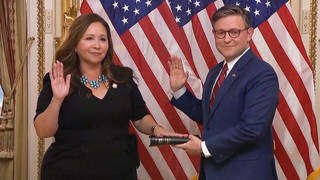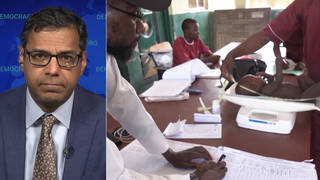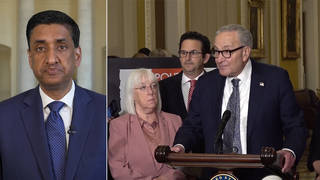
Topics
Democrats forced the Republican-controlled Senate into an unusual closed session Tuesday to question intelligence used by the Bush administration to justify the Iraq invasion. We speak with investigative journalist Robert Parry and Scott Armstrong of the Information Trust about how the CIA leak case indictment has highlighted questions about pre-war intelligence. [includes rush transcript]
The issue of pre-war intelligence remains in the spotlight with last week’s indictment of Vice President Dick Cheney’s chief of staff Lewis “Scooter” Libby over the CIA leak case. Shortly before forcing the closed session, Democratic Senate Minority leader Harry Reid said, “The Libby indictment provides a window into what this is really all about, how this administration manufactured and manipulated intelligence in order to sell the war in Iraq and attempted to destroy those who dared to challenge its actions.” He then invoked a little-used Rule 21 to request the closed session.
- Sen. Harry Reid, “Mr. President, enough time has gone by. I demand on behalf of the American people that we understand why these investigations are not being conducted, and in accordance with Rule 21, I now move the Senate go into closed session.”
The Senate stopped work on legislation. The public was forced to leave the chamber, the doors were closed and the lights were dimmed. C-Span coverage was also turned off for the session which lasted over two-hours. It marked the first time in 25 years one party has closed the Senate to the public without consulting the other party. Republicans dismissed the move as a political stunt. It provoked a sharp public confrontation between the leadership of both parties.
- Sen. Bill Frist, “Democrats used scare tactics. They have no convictions, they have no principles, they have no ideas. This is the ultimate. Since I have been majority leader, I’ll have to say not with the previous Democratic leader or the current Democratic leader, have I ever been slapped in the face with such an affront to the leadership of the grand institution.”
Frist went on to say, “For the next year and a half, I can’t trust Senator Reid.” Reid later responded to Frist’s comments.
- Sen. Harry Reid, “It’s a slap in the face to the American people that this has been — this investigation has been stymied, stopped, obstructions thrown up every step of the way. That’s the real slap in the face. That’s the slap in the face, and today, the mesh people are going to see a little bit of light.”
In the end, lawmakers agreed to name three members from each party to assess the state of the Intelligence Committee’s inquiry into prewar intelligence and report back by November 14th. Back in June 2003, Republicans on the Intelligence committee resisted calls to investigate the administration’s WMD claims. Finally in February 2004, they agreed to a two-step investigation.
In July 2004, the committee issued the first phase of its bipartisan report, which found the U.S. intelligence community had assembled a deeply flawed and exaggerated assessment of Saddam Hussein’s weapons capabilities. The second phase was to focus on the administration’s deliberations over the intelligence or how it was used. Democrats say there has been little examination of these topics to date.
- Scott Armstrong, is executive director of the Information Trust. A former reporter for The Washington Post, he founded the National Security Archive and was a senior investigator for the Senate Watergate Committee.
- Robert Parry, veteran investigative journalist and author of the book “Secrecy & Privilege: Rise of the Bush Dynasty from Watergate to Iraq.” For years he worked as an investigative reporter for both the Associated Press and Newsweek magazine. His reporting led to the exposure of what is now known as the “Iran-Contra” scandal.
Transcript
AMY GOODMAN: Shortly before forcing the closed session, Democratic Senate Minority Leader Harry Reid, said, quote, “The Libby indictment provides a window into what this is really all about, how this administration manufactured and manipulated intelligence in order to sell the war in Iraq and attempted to destroy those who dared to challenge its actions.” Reid then invoked a little-used Rule 21 to request the closed session.
SEN. HARRY REID: Mr. President, enough time has gone by. I demand on behalf of the American people that we understand why these investigations aren’t being conducted, and in accordance with Rule 21, I now move that the Senate go into closed session.
SENATOR: Mr. President, I second the motion.
AMY GOODMAN: The Senate stopped work on legislation. The public was forced to leave the chamber. The doors were closed. The lights dimmed. C-SPAN coverage was also turned off for the session, which lasted over two hours. The move marked the first time in 25 years one party has closed the Senate to the public without consulting the other party. Republicans dismissed the move as a political stunt. It provoked a sharp public confrontation between the leadership of both parties. This is Senate Majority Leader, Dr. Bill Frist, speaking to reporters.
SEN. BILL FRIST: Democrats use scare tactics. They have no conviction, they have no principles, they have no ideas, but this is the ultimate. Since I have been Majority Leader, I’ll have to say, not with the previous Democratic leader or the current Democratic leader have ever I been slapped in the face with such an affront to the leadership of this grand institution.
AMY GOODMAN: Frist went on to say, quote, “For the next year-and-a-half, I can’t trust Senator Reid.” Reid later responded to Frist’s comments.
SEN. HARRY REID: It’s a slap in the face to the American people that this has been — this investigation has been stymied, stopped, obstructions thrown up every step of the way. That’s the real slap in the face. That’s the slap in the face, and today, the American people are going to see a little bit of light.
AMY GOODMAN: In the end, lawmakers agreed to name three members from each party to assess the state of the Intelligence Committee’s inquiry into prewar intelligence and report back by November 14. Back in June 2003, when it became increasingly apparent that no weapons of mass destruction were being found in Iraq, Republicans on the Intelligence Committee initially resisted calls to investigate the administration’s WMD claims. Finally in February 2004, they agreed to a two-step investigation.
In July 2004, the committee issued the first phase of its bipartisan report, which found the U.S. intelligence community had assembled a deeply flawed and exaggerated assessment of Saddam Hussein’s weapons capabilities. The second phase was to focus on the administration’s deliberations over the intelligence or how it was used. Democrats say there’s been little examination of these topics to date.
We’re joined now in our Washington studio by Robert Parry. He is a veteran investigative journalist, for years worked for both the Associated Press and Newsweek magazine. His reporting led to the exposure of what’s now called the Iran-Contra scandal. He is author of the book, Secrecy & Privilege: Rise of the Bush Dynasty from Watergate to Iraq. Scott Armstrong also joins us in Washington, Executive Director of the Information Trust. He is a former reporter for the Washington Post. He founded the National Security Archive and was a senior investigator for the Senate Watergate Committee. We welcome you both to Democracy Now!, and we begin with Scott Armstrong. Scott, can you talk about this very rare move in the Senate to close out the public, one party, the Democrats, surprising the other, demanding a closed session?
SCOTT ARMSTRONG: Well, it really was quite dramatic for what we have come to expect from the Senate Democrats, or for that matter, from any Democrats. After having voted for the war in March of 2003, they began to ask questions about the quality of intelligence and basically were held off. They got this study done, but the study didn’t really get into what the administration had done with the intelligence, just the flaws within the intelligence. The Scooter Libby case has given them the opportunity to say, 'Now there's evidence on the record that there were some unusual things going on, and the doctoring of intelligence, the piecing together and knitting together of very sparse intelligence, and we want to have the rest of this report, which has been put off because of the 2004 election.’ They want to get it, and they want to get it soon.
AMY GOODMAN: Bob Parry, the media’s very much playing this as, you know, a partisan game that’s going on right now, and now the Democrats are attacking the Republicans, and then the Republicans are attacking the Democrats, but, in fact, how serious is this and what can come of this? I mean, among the people who have been named to the inquiry, the Senator from New York, Hillary Rodham Clinton, who continued to support the war, voted for it and has not withdrawn that support.
ROBERT PARRY: Well, it’s important that the American people know what happened. This is a war that has been going on now for several years. 2,000 American soldiers have died. Tens of thousands of Iraqis have died. The American status and standing in the world has been put under question. So, knowing how we got there is certainly important, if for no other reason than having the facts presented to the American people.
This notion, which I think we go back to even to the first part of the report, that the information should be withheld from the American people until after the 2004 election was always quite remarkable. I mean, there aren’t many chances when Americans have to really weigh in and tell their government what they want done, but to withhold the second half of the report until after that election in 2004 suggests that the idea is never really to include the American people very meaningfully in the process to begin with. But at least now, there will be a chance to see if there can be evidence put forth to show what the administration did with the flawed intelligence they got. Clearly, it was a two-step process. There was flawed intelligence, and then there was exaggeration of the flawed intelligence, but knowing the details of that is important.
AMY GOODMAN: We’re also joined in the New York studio by Gilbert Achcar. He is a long-time analyst of issues specifically concerning the Middle East, Iraq, from Beirut, but living in Paris now. Your response when you just fly into the country, and you see Democrats, many of them who authorized the invasion, saying now, “Well, maybe there was a problem with prewar intelligence.” You are based in a country now that never believed that prewar intelligence: France. France and Germany very much opposed and saying that Saddam Hussein was not an imminent threat.
GILBERT ACHCAR: Yes, in the sense that — well, they never stated that Saddam Hussein had had no weapons of mass destruction, because they had no means to assert such a thing, but they thought, and they were right on that, that the U.N. inspection procedure was quite enough to make sure that he hadn’t. So, they saw in this issue of the weapons of mass destruction just a pretext for a war which they understood the United States wanted to wage for some other type of designs, linked with, you know, basically the strategic and economic very high value represented by Iraq and its oil.
AMY GOODMAN: Bob Parry, when you look at the way intelligence was used, and you link it up with the whole Valerie Plame being exposed story and the number of soldiers now who have died in Iraq — we have passed the 2,000 mark, interestingly coming the same week, within the same period as the indictments against Scooter Libby. Can you talk about the connection between these two stories, the soldiers dead, not to mention how many Iraqis have died, and the indictment of Scooter Libby?
ROBERT PARRY: Well, clearly, the American people are more focused now on what’s been happening, because the promises of first an easy war and then a war that would be eventually brought to some conclusion have turned out not to be true. Vice President Cheney was talking about the insurgency being in its last throes several months ago, and Americans have now seen one of the highest months of American fatalities in Iraq in October, so there are tremendous reasons to have doubts about what the public has been told, and I think going back to the Valerie Plame case, what you saw was essentially an additional step to that three parts, the bad intelligence, the misrepresentation of what was there, but then there was also the idea of punishing anyone who raised questions about that intelligence, which goes back really to before the war when you had people like Scott Ritter and even some celebrities like Sean Penn going to Iraq and raising doubts about what the administration really had as evidence.
Those people were largely dismissed. The French, of course, were attacked. We had french fries being changed to “freedom fries” in the United States. We had effectively a war hysteria that went on in late 2002 and early 2003. And now, we are beginning to see now there are consequences when a country loses control of information, where information has been manipulated and misrepresented. People die, and the country suffers dramatically. I think we’re now seeing several parts of that, including the criminality that is alleged to have occurred in the White House relating to Valerie Plame as another facet of this larger picture, a picture of manipulated information, control of information, as a way to get the American people to do what the White House wanted done.
AMY GOODMAN: Scott Armstrong, you played an instrumental role in stopping the Official Secrets Act, a provision that would have criminalized information disclosures by federal employees or whistleblowers for the first time in history. Thanks in large parts to your efforts, Clinton, President Clinton, vetoed the Official Secrets Act. Can you explain what it is and how that fits into what is happening today?
SCOTT ARMSTRONG: Well, there’s always been an attempt by the intelligence community and by certain people, elected officials, appointed officials in any administration to try and use intelligence, use information inside the government, for their own purposes, to leak it selectively. And what’s happened over a period of time is each administration gets frustrated by the fact that they can’t control all of the leaks, and when they can’t, they propose that there be an Official Secrets Act. There are some things that are damaging to the national security that could get leaked out. By and large, they don’t appear. By and large, those are taken out. Hopefully, the reader or the viewer gets the information they need, but journalists tend to take out the things that could be truly damaging, the little details that would reveal that somebody’s been compromised or wiretapped or bugged in some other way.
So, what we have tried to do is keep the intelligence community in a position where the dissent within the intelligence community can continue to come forward. That’s what this is really about. There was a leaking war going on in the spring and summer of 2003, and it continued on as the debate about who put the false information or incorrect information about the African yellow cake, the Niger uranium, into the President’s speech and elsewhere in public statements, and this was a battle between the White House and the C.I.A. I think it’s really less about punishing Wilson through his wife, Valerie Plame, than it was their attempt to demythologize and say he wasn’t really there on such an important mission, he’s just one of those people from the C.I.A.
The irony in this current report that they’re arguing over, that they had the closed session about yesterday, is that the report has been basically watered down, first by the Senate majority, who have asked relatively irrelevant questions, really haven’t got to the heart of the matter, and secondly, when they do get information — which frankly some of the analysts inside the C.I.A. are defending their turf, they’re trying to show that they were not mistaken as much as they were misused — that information then is quashed by the senior people in the C.I.A. and in the administration. So, you have the irony of the Democrats, who haven’t done very much to this point, but finally saying, 'Look, this is — we have gone too long, this is — we don't have the information. We’re not asking the right questions. And frankly, we need to get the raw information that the intelligence analysts have.’ That’s what the public really needs to have to make a judgment.
AMY GOODMAN: We’re talking to Scott Armstrong, Executive Director of the Information Trust, and Bob Parry, who is a veteran investigative journalist. We’re also joined in our New York studio by Gilbert Achcar, who often contributes to Le Monde Diplomatique in Paris. When we come back, I want to ask Scott Armstrong, who is the founder of the National Security Archive, about the federal shield law that, among many others, Judith Miller of the New York Times has been lobbying for, but Scott Armstrong is against it. We’ll find out why in a minute.
[break]
AMY GOODMAN: We’re talking to Scott Armstrong, Executive Director of the Information Trust; Bob Parry, investigative reporter, used to be with A.P. and Newsweek, has written the book, Secrecy & Privilege: Rise of the Bush Dynasty from Watergate to Iraq; and in our New York studio, Gilbert Achcar, who joins us from France, has written the book, The Clash of Barbarism: September 11 and the Making of the New World Disorder, among other books, just flew into New York. Scott Armstrong, New York Times reporter, Judith Miller, defended her decision to go to jail “to protect a source,” she said. She told the journalism conference in Las Vegas that reporters need a federal shield law so that others won’t face the same sanctions. She was jailed for 85 days. Your response?
SCOTT ARMSTRONG: Well, the problem with the shield law as it’s proposed now is it has an exception for national security reporting. So the very area in which you would want people to have their sources protected so that they can have a candid conversation — I mean, you really can’t talk with government officials about national security issues without them — technically unless they’re totally authorized; if they’re really giving you a candid view, they’re violating the law. So the difficulty of being forced to identify your sources through a grand jury isn’t really going to be alleviated by this shield law.
They did put in some good language about there needing to be imminent damage to the national security before they can call you, but Prosecutor Fitzgerald has already said, as some other people in the Justice Department, that Judy Miller would have been called before the grand jury under this new law anyway. So the question is: Are they going to try and get something? Are they going to toughen up other sanctions in return for a shield law that isn’t meaningful to the national security reporting? It’s only meaningful to gossip about inter-agency contacts over some domestic issue in which the fact of the matter that somebody is off the record isn’t particularly critical. The ones that are most critical would be the ones who would be called, so-called, before a grand jury.
AMY GOODMAN: Bob Parry, your response?
ROBERT PARRY: Well, it’s a very difficult area. Because there are times you do have to go off the record with sources to get them to discuss what’s really going on. The problem with the Judy Miller case, and frankly, a number of cases you see in Washington, is that these are not examples of whistleblowers divulging information that’s really important for the American people to know. Often these are government officials using anonymity and often wanting to be treated anonymously to give more credibility to their attacks on people or attacks on political opponents. And so, it’s more of a game.
When I was at Newsweek, we would often run into cases where sources would want to be treated this way, not because the information was that sensitive, but because they felt it had more sex appeal if it was being done sort of on an off-the-record sources basis. But that doesn’t mean there aren’t plenty of cases where you really have a scared person in the bureaucracy who needs to tell or wants to tell the American people something and uses the press to do that. In those cases, reporters really probably do have to be willing to take whatever heat they get, but it’s not something that can be easily legislated. It’s a grey area, and those are always hard to make law about.
AMY GOODMAN: Scott Armstrong, as Executive Director of the Information Trust, you are mediating an off-the-record conversation between people in intelligence and journalists. You can explain what you are doing?
SCOTT ARMSTRONG: Well, I wouldn’t say “mediating,” as much as “facilitating.” What we’re trying to do is make sure that the public can get its information, continue to get information that comes often from what they call unauthorized disclosures from leaks of national security information, but at the same time that we don’t blunder into something where, as a result of an indiscrete reference, we end up doing something that really does damage the national security, really does allow a terrorist to do something. It’s a delicate area, but it’s rich in the sense that there are an awful lot of people in the government that would like you to have more information, and for a variety of reasons — Bob mentioned one of them — that puts a premium to hold things secretly. You can leak them selectively, but for a lot of other reasons, too, they feel unable to have these discussions, and so to some extent, we’re trying to create mechanisms and feedback loops that allow there to be discussion between journalists and the national security community that’s more candid.












Media Options